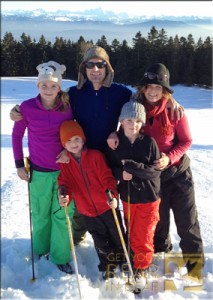 My story begins with sadness and ends on an upbeat note. While the picture of health all his life, my father was diagnosed with CRC with liver mets at age 52 and died after a brief 10 month battle. Hard to believe this was 20 years ago when I was only 24 years old! My father’s GI doctor at the time warned me that I’d need to begin screening at least 10 years prior to his diagnosis (smart guy #1). So the years rolled by, I got married, started a family, and lived a healthy lifestyle (eating well, participating in marathons and other sports and fitness events). My wife began harping on me to get a colonoscopy starting in my mid-thirties (her persistence was fueled by an ironic overlap with Katie Couric who shares my wife and father’s birthday). Nonetheless I kept putting off the screening (this couldn’t happen to me, right?).
My story begins with sadness and ends on an upbeat note. While the picture of health all his life, my father was diagnosed with CRC with liver mets at age 52 and died after a brief 10 month battle. Hard to believe this was 20 years ago when I was only 24 years old! My father’s GI doctor at the time warned me that I’d need to begin screening at least 10 years prior to his diagnosis (smart guy #1). So the years rolled by, I got married, started a family, and lived a healthy lifestyle (eating well, participating in marathons and other sports and fitness events). My wife began harping on me to get a colonoscopy starting in my mid-thirties (her persistence was fueled by an ironic overlap with Katie Couric who shares my wife and father’s birthday). Nonetheless I kept putting off the screening (this couldn’t happen to me, right?).
My perspective changed when I was randomly attacked by a dog during a training run, and landed in the OR to get cleaned up. The attending physician (smart guy #2) did a quick medical history, and was appalled to discover that I hadn’t yet gone for colon cancer screening given my family’s history. So, at the age of 37 I had my first colonoscopy, and lo and behold they found a nasty (albeit benign, thankfully) adenoma. It was removed, and the doctor recommended I return in 5 years for another colonoscopy (this doctor had good intentions, but was perhaps not the smartest guy!). I had my second colonoscopy at 42, and (voila) they found two more nasty and fairly large (again benign, thankfully) adenomas. My current doctor (different than previous) told me I was very lucky, that I’d waited too long, and that I should be screened more frequently given my age and the findings. I was referred to a fascinating and brilliant GI genetics doctor (very smart guy #3) who assisted me in the rather difficult task of collecting and interpreting family history (through medical records, biopsies). All of this was complicated by passage of time, HIPAA regulations, and convoluted family dynamics. As it turned out, my father was not the first in the family to succumb to CRC. Based on the history, there is a clear trend in the family with regard to colon cancer over multiple generations. On the upside, I have been dealt a favorable set of cards with this knowledge. In fact, I believe it might have saved my life. With the knowledge of family history and regular screening, I am now calling the shots (not CRC!) and there is no reason that I should face a similar fate. I am now on the one year screening program until further notice. I find the process to be no big deal. Here are a few things I’ve learned:
-We have made remarkable progress over the last 20 years in preventing CRC thanks to organizations like GYRIG. Well done!
-Despite the progress made, more needs to be done to increase awareness. Education is key. Confronting denial and the tendency for many to avoid screening must be addressed (we need to debunk myths about colonoscopy – a sense of humor is a good place to start!). My father was a doctor born from generations of doctors – of all people he should have suspected something given the history. Sadly he chose to ignore!
-Not all doctors are focused on hereditary CRC. Doctors can and do make recommendations for routine colonoscopies based on norms for the non-high risk population. Again, education and knowing one’s family history is key. Provide this information to your doctor, and devise a plan.
-Colonoscopy screening must be available to everyone taking into account all potential risk factors, and should not be rationed out by insurance providers.
With all the sadness associated with losing a loved one to CRC, it is important to recognize that lives are being saved. Thanks again GYRIG and keep up the good work!
